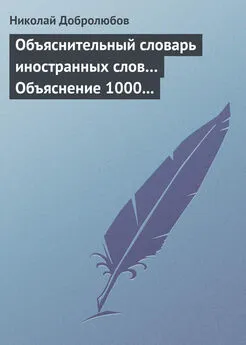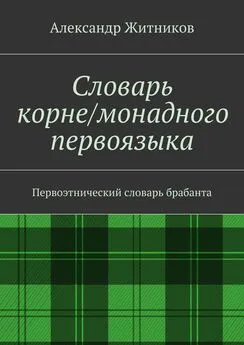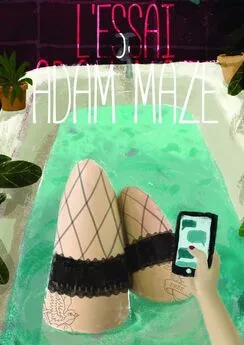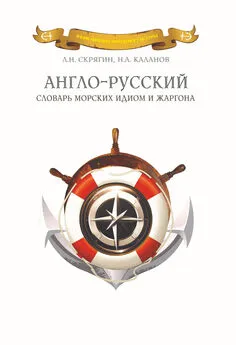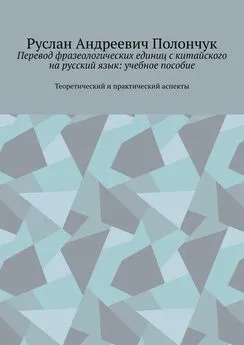Adam Makkai - Словарь американских идиом: 8000 единиц
- Название:Словарь американских идиом: 8000 единиц
- Автор:
- Жанр:
- Издательство:неизвестно
- Год:неизвестен
- ISBN:нет данных
- Рейтинг:
- Избранное:Добавить в избранное
-
Отзывы:
-
Ваша оценка:
Adam Makkai - Словарь американских идиом: 8000 единиц краткое содержание
Это обновленное и дополненное издание, содержащее более 8000 идиоматических
слов и выражений, причем каждое из которых снабжено грамматическим объяснением
и практическим примером. Словарь содержит лексемные идиомы, фразеологические
единицы и поговорки, имеющие особенное значение. В нем приведены наиболее
употребительные выражения только американского английского языка. Этот словарь — идеальное пособие для студентов, часто разъезжающих бизнесменов и просто
путешественников.
Словарь американских идиом: 8000 единиц - читать онлайн бесплатно полную версию (весь текст целиком)
Интервал:
Закладка:
[scrimmage]See: LINE OF SCRIMMAGE.
[scrounge around] {v. phr.} , {slang} 1. To search for an object aimlessly without having one clearly in mind. •/ I don’t know what’s the matter with him, he is just scrounging around all day long. / 2. To look around for a way to get a free drink or a free meal. •/ Sue and her husband are so broke they never eat properly; they just scrounge around from one place to the next until someone offers them something. /
[sea]See: AT SEA, BETWEEN THE DEVIL AND THE DEEP BLUE SEA, HIGH SEAS, NOT THE ONLY FISH IN THE SEA, PUT TO SEA.
[sea legs] {n. phr.} 1. Adjustment to being in a boat that is rocking on the sea. •/ This is my first transatlantic trip so give me a day to get my sea legs before you make me dance. / 2. Adjustment to a new job or situation. •/ "I have just been transferred here and I haven’t found my sea legs yet," the new colleague joked. /
[seam]See: BURST AT THE SEAMS.
[search]See: IN SEARCH OF.
[search me] {informal} I don’t know; how should I know? — May be considered rude. •/ When I asked her what time it was, she said, "Search me, I have no watch." /
[search one’s heart]or [search one’s soul] {v. phr.} , {formal} To study your reasons and acts; try to discover if you have been fair and honest. •/ The teacher searched his heart trying to decide if he had been unfair in failing Tom. / — [heart-searching]or [soul-searching] {n.} or {adj.} •/ After much heart-searching, Jean told Beth she was sorry for the unkind things she had said. / •/ The minister preached a soul-searching sermon about the thoughtless ways people hurt each other. /
[search out] {v.} To search for and discover; find or learn by hunting. •/ The police were trying to search out the real murderer. /
[search with a fine-tooth comb]See: FINE-TOOTH COMB.
[season]See: HIGH SEASON, IN SEASON, LOW SEASON, OUT OF SEASON.
[seat]See: BACK SEAT DRIVER, FLY BY THE SEAT OF ONE’S PANTS, HOT SEAT, JUDGMENT SEAT, TAKE A BACK SEAT.
[seat belt] {n.} A strong strap used to protect a person in a moving car or other vehicle by holding him in his seat. •/ When the plane began to land, Billy and his mother fastened their seat belts. / •/ Passengers in automobiles should wear seat belts for safety. /
[second]See: PLAY SECOND PIDDLE, SPLIT SECOND.
[second best] {n.} Something that is lower than or not quite as good as the best. •/ Tom liked the deluxe model bicycle; but he could afford only a second best. / •/ Joan chose the best and Mary had to take the second best. / •/ There were ten boys in the race. Jack won and Fred was a close second best. / Compare: RUNNER UP.
[second best] {adv.} Second; in second place. •/ The team came off second best in the game. /
[second-best] {adj.} Next to best; second in rank. •/ Mary wore her second-best dress. / •/ Bob was the second-best player on the team. / •/ "I am the second-best student in this school because I was second best in the Milwaukee competition." /
[second childhood] {n. phr.} Senility; dotage. •/ "Grandpa is in his second childhood; we must make allowances for him at the dinner table," my mother said, as Grandpa dropped food all over the place. /
[second class] {n.} 1. The second best or highest group; the class next after the first. •/ Joe was good enough in arithmetic to be put in the second class but was not good enough for the first. / Compare: FIRST CLASS. 2. The place or quarters, especially on a ship, train, or airplane which people travel who pay the next to the highest fare. •/ Aunt May bought a ticket to travel in the second class on the boat trip. / Compare: FIRST CLASS, THIRD CLASS. 3. A class of mail that includes magazines and newspapers published at least four times a year and costs less for mailing than first class mail. Compare: FIRST CLASS.
[second-class(1)] {adj.} 1. Belonging in the class that is next to the highest or next best. •/ He was only a second-class math student. / •/ His parents traveled as second-class passengers on the boat. / •/ The periodical came as second-class mail. / Compare: FIRST-CLASS, THIRD-CLASS. 2. Not so good as others; second-rate. •/ They were never given full democratic rights but were always treated as second-class citizens. /
[second-class(2)] {adv.} By second class. •/ We went second-class on the train to New York. / •/ I mailed the newspaper second-class. /
[second cousin] {n.} A child of your father’s or mother’s first cousin. •/ Mary and Jane are second cousins. /
[second-guess] {v. phr.} 1. To criticize another’s decision with advantage of hindsight. •/ The losing team’s coach is always second-guessed. / 2. To guess what someone else intends or would think or do. •/ Television planners try to second-guess the public. /
[secondhand] {adj.} Used; not new; preowned. •/ Sometimes a secondhand car is just as reliable as a brand new one. /
[second nature] {n.} Something done without any special effort, as if by natural instinct. •/ Cutting tall trees has become second nature to the experienced lumberjack. /
[second-rate] {adj.} Of mediocre or inferior quality. •/ The movie received a bad review; it was second-rate at best. /
[second-run] {adj.} Of a movie: Shown in many movie theaters before, and allowed to be shown later in other movie theaters. •/ Tickets to second-run movies cost much less. /
[second sight] {n. phr.} Intuition; prescience; clairvoyance. •/ Some police departments employ psychics to find missing persons or objects as they are said to have second sight. /
[second thought] {n.} A change of ideas or opinions resulting from more thought or study. •/ Your second thoughts are very often wiser than your first ideas. / •/ We decided to climb the mountain, but on second thought realized that it was too dangerous. / Compare: THINK BETTER OF.
[second to none] {adj. phr.} Excellent; first rate; peerless. •/ Our new State University campus is second to none. There is no need to pay all that high tuition at a private college. /
[second wind]also [second breath] {n.} 1. The easier breathing that follows difficult breathing when one makes a severe physical effort, as in running or swimming./ •/ After the first quarter mile, a mile runner usually gets his second wind and can breathe better. / •/ We climbed with labored breathing for half an hour, but then got our second wind and went up more easily. / 2. {informal} The refreshed feeling you get after first becoming tired while doing something and then becoming used to it. •/ Tom became very tired of working at his algebra, but after a while he got his second wind and began to enjoy it. /
[secret]See: IN SECRET, OPEN SECRET.
[section gang]or [section crew] {n.} A group of railroad workers who watch and repair a number of miles of track. •/ The section crew was called out to fix the broken bridge. /
[section hand] {n.} A worker who repairs railway track; one of the men in a section gang. •/ The section hands moved off the track while the train went by. /
[security blanket] {n.} , {slang} , {colloquial} An idea, person, or object that one holds on to for psychological reassurance or comfort as infants usually hang on to the edge of a pillow, a towel, or a blanket. •/ Sue has gone to Aunt Mathilda for a chat; she is her security blanket. /
[see]See: CAN’T SEE THE WOODS FOR THE TREES, LET ME SEE or LET’S SEE.
[see a lot of] {v. phr.} To go out regularly with someone; have an affair with someone. •/ They have been seeing a lot of each other lately. /
[see about] {v.} 1. To find out about; attend to. •/ If you are too busy, I’ll see about the train tickets. / 2. {informal} To consider; study. •/ I cannot take time now but I’ll see about your plan when I have time. / Compare: SEE TO, LOOK INTO, THINK OVER.
[see after]See: LOOK AFTER.
[see better days] {v. phr.} 1. To enjoy a better or happier life. •/ Mr. Smith is poor now, but he will see better days. / 2. To become old, damaged, or useless. Used in the perfect tense. •/ Mv blue coat is ten years old. It has seen better days. / •/ Our car wasn’t old, but it had seen better days. /
[see beyond one’s nose]or [see beyond the end of one’s nose] {v. phr.} To make wise judgments about questions of importance to yourself and others; act with farseeing understanding. Used in negative, conditional, and interrogative sentences. •/ He couldn’t save money or make plans for the future; he just never saw beyond the end of his nose. / •/ People who always complain about school taxes would stop it if they could see beyond their noses and understand the importance of first-class schools. /
[seed]See: GO TO SEED or RUN TO SEED.
[see daylight] {v. phr.} , {informal} To know that an end or success is near. •/ We thought we would never finish building the house, but now we can see daylight. / •/ Sarah thought it would take forever to read the book for her report, but finally she saw daylight. /
[see eye to eye] {v. phr.} To agree fully; hold exactly the same opinion. •/ Though we did not usually agree, we saw eye to eye in the matter of reducing taxes. / •/ Jim did not see eye to eye with Sally on where they would go for their vacation. /
[see fit]or [think fit] {v. phr.} To decide that an action is necessary, wise, or advisable; choose. •/ Jim asked "Dad, what time should I come home after the dance?" His father answered, "You way do as you see fit." / — Often used with an infinitive. •/ After much thought, we did not see fit to join the Smiths on their Caribbean cruise. / •/ The boys were angry because Ed thought fit to report the fight to the principal. /
[see how the land lies] {v. phr.} , {informal} To reconnoiter; investigate. •/ Before going there in person to ask for a job, you had better see how the land lies and who does what. / Compare: CASE THE JOINT.
[seeing is believing]Seeing something is good proof. •/ Bill told Joe he had passed his test, but Joe said, "Seeing is believing." /
Читать дальшеИнтервал:
Закладка:

